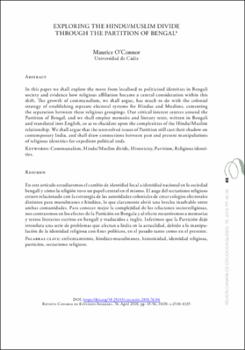Exploring the Hindu/Muslim Divide through the Partition of Bengal
Autor
O'Connor, MauriceFecha
2018Resumen
En este artículo estudiaremos el cambio de identidad local a identidad nacional en la sociedad bengalí y cómo la religión tuvo un papel central en el mismo. El auge del sectarismo religioso estuvo relacionado con la estrategia de las autoridades coloniales de crear colegios electorales distintos para musulmanes e hindúes, lo que claramente abrió una brecha insalvable entre ambas comunidades. Para conocer mejor la complejidad de las relaciones sociorreligiosas, nos centraremos en los efectos de la Partición en Bengala y al efecto recurriremos a memorias y textos literarios escritos en bengalí y traducidos a inglés. Inferimos que la Partición dejó irresoluta una serie de problemas que afectan a India en la actualidad, debido a la manipulación de la identidad religiosa con fines políticos, en el pasado tanto como en el presente. In this paper we shall explore the move from localised to politicised identities in Bengali society and evidence how religious affiliation became a central consideration within this shift. The growth of communalism, we shall argue, has much to do with the colonial strategy of establishing separate electoral systems for Hindus and Muslims, cementing the separation between these religious groupings. Our critical interest centres around the Partition of Bengal, and we shall employ memoirs and literary texts, written in Bengali and translated into English, so as to elucidate upon the complexities of the Hindu/Muslim relationship. We shall argue that the unresolved issues of Partition still cast their shadow on contemporary India, and shall draw connections between past and present manipulations of religious identities for expedient political ends.





